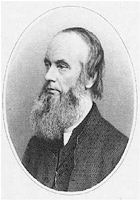The Abbot Of Muchelnaye. Canto The First. Poem by Henry Alford
The Abbot Of Muchelnaye. Canto The First.
With pale ray--for she hath no fellow yet--
The eve--star shineth out above the west;
The sheep--bell tinkles, and the fold is set;
The swinkt kine, one by one, are laid to rest;
The rooks have ceased from chattering in their nest;
And shepherds whistle homeward through the gray
And misty flats, where from the elm--wood's breast
Forth rise, empurpled with the parting day,
The dim embattled tops of solemn Muchelnaye.
Before the rosy streak had vanishèd
From the last cloud that looked upon the sun,
In yonder abbey--pile the mass was said,
The psalm was chanted, and the vespers done:
The holy men are singly pent each one
In chamber climbed by solitary stair;
And he who laboured in far fields alone
Late passing, hears upon the twilight air
Tu, Jesu, salva me--their deep and secret prayer.
The abbot sitteth in his chamber lone,
But now he laid his sacred vestment by,
And leaned his crosier on the fretted stone;
He prayeth not, but out into the sky
He looketh forth with wild and dreamful eye,
Under the quatre--foils of many hues
Carved in the clustered mullions broad and high;
Full sorrowfully seems his heart to muse,
And fetches other sighs than holy abbots use.
Belike he hath called up his youthful days,
Before he gave his soul to wait on Heaven,
When his steps wandered into downward ways;
And he has thought of sins to be forgiven,
Like thunder--strokes athwart his conscience riven;
But all the fond admissions of his youth
Long since by prayer and penance have been shriven;
And he hath offered up, in shame and sooth,
His sad and peccant soul at the bright shrine of Truth.
But he hath much to do with earthly sighs;
There is a vision of pure loveliness,
Linked to a thousand painful memories
That sear his inner soul with deep distress;
He kneeleth to his prayer, but not the less
That rising sorrow will not be represt:
He prayeth, but his lot he may not bless;
He drops his arms, erewhile that crossed his breast,
And counsels how his sad heart he may lighten best.
Yet time has been when he was bold and gay,
A boy of open brow and lordly mien;
Him on his proud steed, at the rise of day,
First in the field his father's hills have seen,
To rouse the forest deer; and time has been
When he hath whispered words in lady's bower,
And wandered not alone in sward--paths green,
What time he wooed and won, in luckless hour,
The high--born Lady Agnes of St Dunstan's tower.
One life--consuming thought his peace destroys;
Before his memory pass in wild array,
As they have passed full often, all the joys
That rose and set upon his bridal day;
Oh, might he see that priest, who could betray
The secret trusted to his troth to keep,
And could that morn the solemn service say
With inward plot of treachery dark and deep;--
But let him rest--for vengeance will not alway sleep.
That form of saintly beauty, robed in white,
With yielded hand; his heart in bliss intense
High--throbbing with the triumph of delight;
Those downward eyes of maiden innocence;
That first sweet look of wedded confidence;--
And then the armèd grasp, the short reply,--
The dizzy swoon that feetered all his sense;--
The waking underneath the portal high,
In the faint glimmering light, with pale monks standing by.
He hath had power; but, all athirst for love,
He passed it by, and tasted not: the earth
Each summer--tide, in meadow and in grove,
Teemed with the riches of her yearly birth;--
High music and the sounds of holy mirth,
Evening and morning, fell upon his ear;--
But all this, heard or seen, was nothing worth,
So there were wanting one sweet voice to cheer;
Were this his Eden ground, he finds no helpmate here.
His not ``the sickening pang of hope deferred,''
Nor calm dismission of a treasure lost,
But anguish deep, unwritten and unheard,
Of the full heart amidst fulfilment crost;
When most assured, then downward smitten most.
Yet did the lamp of love burn upward bright;
Yet did the flame, though by fierce tempest tost,
With ever--constant and consoling light
In solitude pierce through his spirit's darkest night.
His waking thoughts with sorrow trafficked most:
But when the gentle reign of sleep began,
Then through a varied and uncounted host
Of pleasant memories his free fancy ran;
Sometimes the heavenly harps their strain began,
Responsive quiring to each angel--hand;
And brightest throned amidst the high divan,
Sweetest in voice of all the sainted band,
Was she--his wedded spouse--the glory of that land.
Sometimes through twilight fields or summer grove
They went in converse; and the wondrous power
Of world--creation viewed by light of love;
Sometimes he saw her with a blessèd dower
Of fairest children, and each little flower
Grow into beauty, and its station keep
Around their common life;--thus the night--hour
Would pass dream--hallowed, and then faithless sleep
Steal from his widowed couch, and he would wake and weep.
This poem has not been translated into any other language yet.
I would like to translate this poem